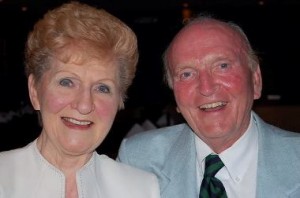It’s hard to know which of Joe Hill’s love stories to tell first, the one he wrote about in his novel, “The Irish Rose,” which celebrates the life and mourns the death at 59 of his wife, Lillian, or the one he’s living with his second wife, Anne.
“I met two beautiful women in my life and I married both,” Hill said, laughing, at a recent book signing at the Shanachie Pub and Restaurant in Ambler.
We’ll start with Lillian, who is Tara O’Shea O’Malley in “The Irish Rose,” A Dublin-born 24-year-old who emigrated to the US and married at the age of 29, bearing four children. In his book, Hill starts this love story with the beginning of its end, when Tara–Lillian–learns she had breast cancer. As it does in life, the diagnosis tinges everything, even the recounting of the happy days of their marriage to the last pages, when both husband and wife come to grips with the inevitable.
“Lillian died in 1994,” says Hill, who was an elementary school English teacher, now retired from the Philadelphia schools. “I thought my life was over.”
Not long after her death, Hill began writing their story. “When I’m by myself I’m either reading a book or writing. Writing this was a catharsis for me. I wrote it in longhand and went over it many times over the years. Every time I made changes. I’m not computer literate so my kids typed it for me.”
While the writing tempered some measure of his grief, Hill still felt like a shell of a man. “I was a biological, functioning person. My wife died. My life died. But. . .” he smiles. “Then I met Anne and I learned that you can live again. Anne brought me fully back to life.”
Anne, who is 12 years Hill’s senior but looks 20 years younger than her age (83), was a widow, a business owner, and, most important, the head of the St. Christopher Singles Social Support Club. She was, as one of Hill’s friends, who urged him to attend one of the club’s dances, called her, “the redhead who runs the place.”
The dance where they met was actually Anne’s last. “I’d been head of the group for 10 ½ years and I’d stayed too long at the prom,” explains Anne, whose penchant for wisecracking is reminiscent of Myrna Loy’s sparkling, snappy dialogue in the “Thin Man” movies of the ‘30s. “This was Joe’s first dance. In my job, I made a point to go over and greet anyone who was alone, so I approached him and we chatted. Then he asked me, ‘Are you allowed to dance?’”
She was, and they did. And they talked. “It wasn’t love at first sight,” admits Anne, “but there was something there. I knew this man was special. After that night he kept calling and calling. He was determined.”
In fact, Joe called Anne on the anniversary of her husband’s death. “It was July 21 at 11:20 AM and Joe remembered that,” she says, clearly awed. “He talked to me for a half an hour and I asked him at one point, ‘Where are you calling from?’ He said, ‘Rome.’ I was amazed. But that’s the way he is. When he got off the plane he called and asked if he could come over. I had a date that night and I cancelled it!”
He remembers their first kiss. They were standing near the river, looking out at the lights on the water. “Anne was talking and talking, as she does,” he recalls. “I looked at her and I thought, ‘I have to stop those lips from talking!’ So I kissed her.”
He also entrusted her with his book. “I wanted her to read it,” he says. She found it heartbreaking. “When I got to the end I couldn’t read anymore. It was like my husband, John’s dying all over again. It was so real,” says Anne, who later helped her husband by editing the last draft of the manuscript before it was published.
In fact, the last few chapters of “The Irish Rose” are so compelling and sad, it’s as difficult to put the book down as it is to read it. Hill leaves Tara’s husband and family on the morning of her funeral, at that time after a death when the polarities of finality and uncertainty both clash and meld. In the last paragraph, Hill writes, “From my bereavement will I one day awaken reconciled to a new life?”
Clearly, yes.

